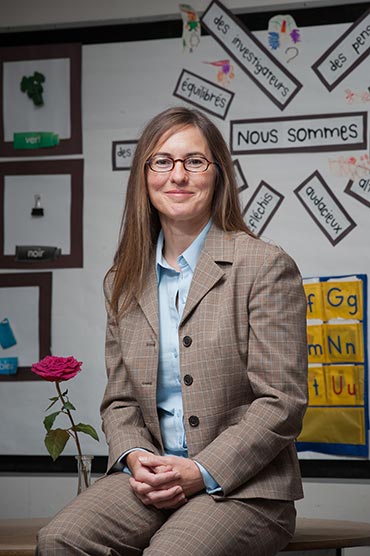For Charlotte Fekete, who grew up in Montreal with European-born parents who spoke multiple languages, the only way to learn a language properly is to be immersed in it. Many of her family members still reside in areas of the world where being unilingual is extremely rare, so for Charlotte, the French Immersion is a natural fit.
“The tipping point for choosing French Immersion was that I could not imagine bringing up a unilingual child in this part of the world and, in particular, in my family,” says Charlotte.
Charlotte and her husband, Greg, visited many different schools, beginning as early as preschool, looking for an environment that could find a calmer atmosphere, but still provide a challenge. Her two boys, who will enter Grades 4 and 9 this year, are very different learners, but both have done very well.
“I didn’t think the language component in other schools were robust enough to instill a second language,” she explains.
Though she had heard concerns that English might be compromised, it didn’t turn out that way at all.
“My eldest is a very verbal child – language came easily to him,” says Charlotte, who was surprised that even though English reading doesn’t begin until Grade 4, her eldest was reading chapter books in English by the end of Grade 3. “It was interesting that he could just do that without the instruction – it just happened.”
Charlotte’s younger child is reading English at grade level now, and both languages came together fine. She noted too that while some of the children attending early French Immersion are new to Canada and spoke neither language well at first, these children got the added bonus of learning both French and English at the same time.
As a bilingual parent, Charlotte is able to help with homework more directly, but that doesn’t leave her husband, who is an Anglophone, feeling left out. Over time, the kids themselves take a lot of control over their learning.
“By high school, my older son was quite able to translate copy into English for Greg, who can then help by discussing the structure of the problem in English,” explains Charlotte
As for the primary benefit she hopes her children will receive after a French Immersion program, Charlotte says the broadened perspective her kids will get is ample reward.
“The moment you understand another language, you understand culture and people at a much deeper level,” she says. “The first year is demanding, but once you’re over that hump, it’s an easier way to learn a language because it’s second nature – you’re not really learning a language at all, you’re just going to school.”

